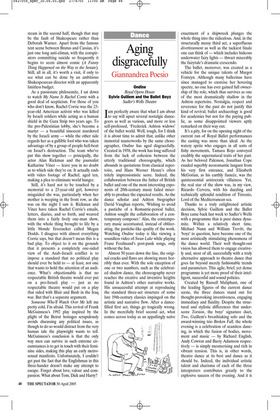Regime change
Toby Young
Julius Caesar Barbican My Name Is Rachel Corrie Royal Court Someone Who’ll Watch Over Me New Ambassadors It’s quite hard to enjoy Shakespeare’s history plays these days if you have any sympathy for Blair’s decision to throw in Britain’s lot with America in the Iraq war. First, Nicholas Hytner gave us a revisionist version of Henry V in which the young king was portrayed as a shallow glory-seeker willing to embark on a reckless military adventure in order to cement his historical reputation. And now Deborah Warner has directed a version of Julius Caesar in which Brutus has been cast in the Blair role, first attempting to bring about regime change through the judicious use of violence, and then gradually succumbing to the maelstrom of death and destruction he has unwittingly unleashed.
My advice is to ignore Warner’s cackhanded attempt to inject the play with a bit of contemporary resonance and try to focus on the many things that there are to enjoy in this production. The action takes place on an epic scale, with over 100 actors flooding the stage for the crowd scenes, and you get a real sense of history unfolding before your eyes. Simon Russell Beale is terrific as Cassius first devious, then holier-than-thou — and Ralph Fiennes is an intriguing Antony, portraying him as a kind of James Bond villain, bent on world domination. Even the actor playing Julius Caesar — John Shrapnel makes a decent fist of a fairly thankless role. Only Anton Lesser as Brutus is disappointing. He plays him as a weak-minded idealist hopelessly out of his depth in the world of realpolitik, which makes it hard to understand why he is considered so vital to the success of the conspirators’ enterprise.
Of course, it’s full of things that don’t work, too, as any production on this scale is bound to be. Almost everything to do with the extras is wrong, from the very first moment, when one of them skateboards across the stage, to the bloody climax, when a female member of the mob that’s just pounced on Cinna attempts to rape the poor man. They’re meant to be ‘street’ people, decked out in slogan T-shirts and combat trousers, but they look like the chorus from some self-consciously ‘hip’ musical — Rent, for instance, or Taboo. You expect them to break into a rendition of ‘La Vie Bohème’ at any moment.
Alas, the play completely runs out of steam in the second half, though that may be the fault of Shakespeare rather than Deborah Warner. Apart from the famous tent scene between Brutus and Cassius, it’s just one long anti-climax, with the conspirators committing suicide so frequently it begins to seem almost comic (A Funny Thing Happened on the Way to the Senate). Still, all in all, it’s worth a visit, if only to see what can be done by an ambitious Shakespearean director with an apparently limitless budget.
As a passionate philosemite, I sat down to watch My Name Is Rachel Corrie with a good deal of scepticism. For those of you who don’t know, Rachel Corrie was the 23year-old American activist who was killed by Israeli soldiers while acting as a human shield in the Gaza Strip two years ago. To the pro-Palestinian lobby, she’s become a martyr — a beautiful innocent murdered by the Israeli army — while the other side regards her as a gullible fool who was taken advantage of by a group of people hell-bent on Israel’s destruction. The team who’ve put this show together — principally, the actor Alan Rickman and the journalist Katharine Viner — leave you in no doubt as to which side they’re on. It actually ends with video footage of Rachel, aged ten, making a plea to eliminate world hunger.
Still, it’s hard not to be touched by a memorial to a 23-year-old girl, however misguided she was, particularly when her mother is weeping in the front row, as she was on the night I saw it. Rickman and Viner have taken Rachel Corrie’s emails, letters, diaries, and so forth, and weaved them into a fairly lively one-man show, with the whole thing brought to life by a little blonde firecracker called Megan Dodds. I disagree with almost everything Corrie says, but that doesn’t mean this is a bad play. To object to it on the grounds that it presents a completely one-sided view of the Arab–Israeli conflict is to impose a standard that no political play should ever be held to — at least, not one that wants to hold the attention of an audience. What’s objectionable is that no respectable British theatre would ever put on a pro-Israeli play — just as no respectable theatre would put on a play that sided with Blair and Bush in the Iraq war. But that’s a separate argument.
Someone Who’ll Watch Over Me left me pretty cold, I’m afraid. This revival of Frank McGuinness’s 1992 play inspired by the plight of the Beirut hostages scrupulously avoids discussing any political issues, as though to do so would distract from the very human tale the playwright wants to tell. McGuinness’s conclusion is that the only way men can survive in such extreme circumstances is to get in touch with their feminine sides, making this play an early metrosexual manifesto. Unfortunately, I couldn’t get past the fact that the Englishman in this three-hander doesn’t make any attempt to escape. Forget about love, valour and compassion. What about Tom, Dick and Harry?





















































 Previous page
Previous page